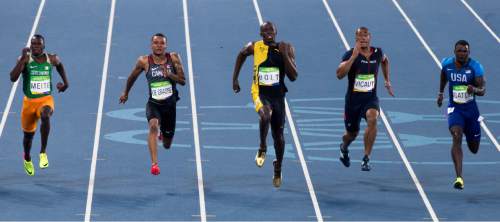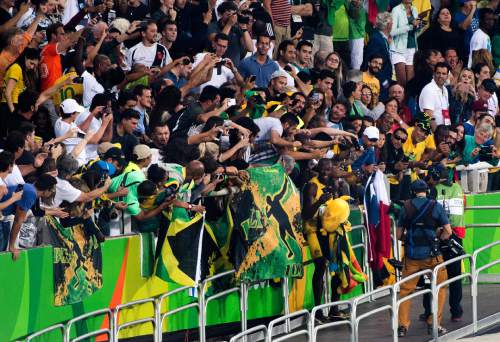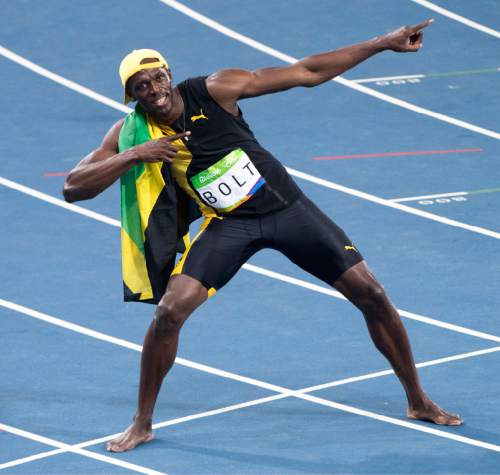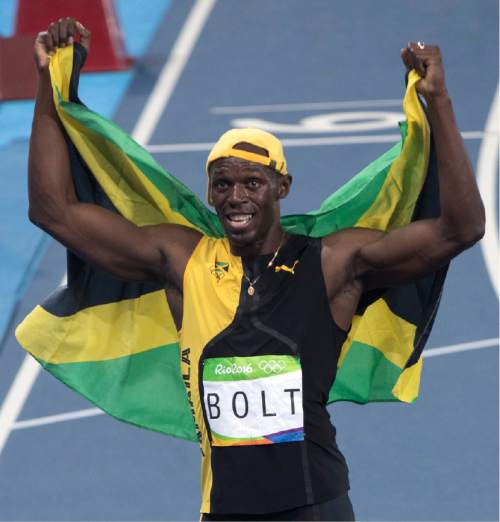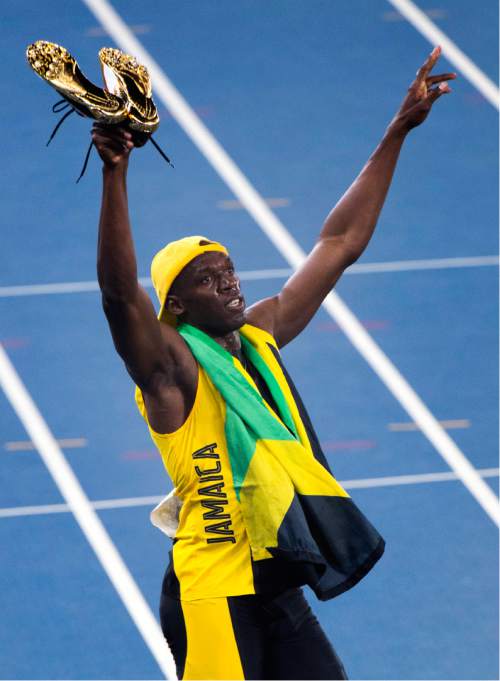This is an archived article that was published on sltrib.com in 2016, and information in the article may be outdated. It is provided only for personal research purposes and may not be reprinted.
Rio de Janeiro • As I scanned the enormity of the press corps stacked up so high inside the Olympic Stadium, where basically every journalist or media type had his or her cell phone in hand ready to hit record, a thought dawned on me before the fastest human being alive locked into those starting blocks:
What hasn't already been written, said or even thought when it comes to Usain Bolt?
Does that sort of greatness ever get stale? Does the Jamaican blur, who endears himself to fans around the globe with that distinct Bolt showmanship, ever feel threatened in those gold spikes? The answer to each is a very resounding no. The in-stadium spectacle of the men's 100-meter dash lives up to its hype, and it's all because of Bolt.
The tens of thousands in attendance Sunday night waited for time to fly by in anticipation of the man who jogs to gold medals. Bolt coasted easily to a 100-meter semifinal win, a heat that became infamous when the 29-year-old could only snicker as he checked his right and left and saw an increasing lead. That sprint told this version of Bolt's night: A little older, surrounded by upgraded competition, the rest of the world gunning for him.
Bolt, the man who took it upon himself to serve as the entertainer of every Olympics since first tasting gold in 2008, laughs it off. In the 100-meter final, American Justin Gatlin busted out of the blocks, and for a few seconds, made those eyes glued think of the alternative. Instead, Bolt turned it on. As he always does. And somehow at the end, looked like he was jogging to another gold medal having just passed the seven other fastest people around with another smile on his face.
The Main Event, The Big Ticket — whatever you want to call Bolt's rule of the 100-meter dash — is no exaggeration. Reporters late to the Olympic Stadium on Sunday found themselves stuck in a line outside as the night wore on. Every seat was booked. The Wi-Fi, which has been a strength of covering these Games, couldn't handle the mass of tweets, Facebook updates or Instagram posts.
Reporters on my row resorted to tipping their laptop screen down and just taking it in with a pen and paper during the 45 minutes before Bolt won a record third straight gold medal in the 100-meter dash. Bolt's surge in the final, he explained afterward, proved similar to a recurring dream he has where the uncatchable man is being chased.
"Hopefully the dream will stop," he said. "It is always that same dream every now and then, but it is a good dream because they never catch me."
Six hours before I saw Bolt toy with the competition from on high, I sat in a frigid press conference room at the Main Press Center. It was the final Olympic news conference for Michael Phelps, who as soon as he sat down affirmed his future after reaching 23 career gold medals and 28 Olympic medals overall.
"This is the last time you'll ever see me in the water racing again," he said.
Phelps spoke for about 30 minutes. He answered questions like how often he'll return to visit his hometown of Baltimore, how he'll approach his upcoming stint as a volunteer assistant coach at Arizona State University, how fatherhood changed him, how ending the most-prolific Olympic career ever his way here in Brazil was what truly mattered to him.
It was, as he's vowed all along, the last goodbye. Phelps battled an onrush of tears as he talked about his relationship with longtime coach Bob Bowman. He said he would love nothing more than to see his Olympic records broken one day. When the microphone couldn't find the appropriate reporter in the crowd, it was Phelps who directed traffic from his front-and-center spot on the dais.
He's done, he repeated. He wants to be there for his son, Boomer. Every step of the way, he said. He doesn't want to miss a single thing. The penultimate question posed to the 31-year-old was regarding where he leaves his Olympic medals. "A secret spot," Phelps said. It would be, he admitted, a sight to see all 28 of them together.
Then he signed off.
"You guys won't see me at one of these for a long time," he said. "See you later."
And that was it. Whisked away to a nearby door to hop in a car and start life as a retiree, Michael Phelps said goodbye forever. On my short walk back to the Main Press Center, a Rio volunteer who also attended the Phelps presser ran into a buddy of his outside the sliding doors.
"He's done, right?" the buddy asked.
"That's what he said," the volunteer responded, "but we'll see."
Twitter: @chriskamrani


